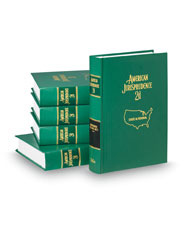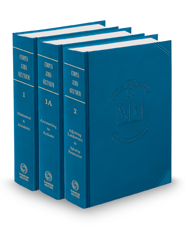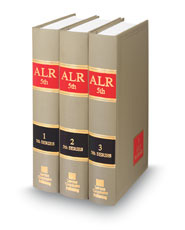 AmJur and CJS are national legal encyclopedias that cover both federal and state legal topics. Entries are often concise and contain annotations to other secondary sources (such as treatises, practice materials, jury instructions, legal scholarship, etc.). AmJur is considerably more popular than CJS (which is widely disfavored). Legal encyclopedias may be a great starting point for your research within a topical area you are unfamiliar.
AmJur and CJS are national legal encyclopedias that cover both federal and state legal topics. Entries are often concise and contain annotations to other secondary sources (such as treatises, practice materials, jury instructions, legal scholarship, etc.). AmJur is considerably more popular than CJS (which is widely disfavored). Legal encyclopedias may be a great starting point for your research within a topical area you are unfamiliar.
 American Jurisprudence
American Jurisprudence
 Corpus Juris Secundum
Corpus Juris Secundum
American Law Reports (ALR) is a large multi-volume set that contains detailed articles on narrow issues of the law. There are multiple series of ALR:
These sets are available in print and on both Westlaw and Lexis. Unlike encyclopedias, ALR entries are not organized by topic. Instead, they are published chronologically and may be updated at different intervals. They are not intended to be comprehensive in their subject coverage but if you do find an article on point for your research task, they are often an invaluable resource.
 American Law Reports
American Law Reports
A digest is a collection of headnotes, taken from cases (as reported in case reporters) and categorized by topic. A headnote is a sentence-long summary of a legal issue that was discussed in a case.
The most commonly used digests are published by West’s Publishing Co. West’s publishes nearly all publishable cases from both state and federal courts. Thus, its digest system can be almost universally applied. West’s digests are organized by the Key Number classification system, which classifies each legal issue or topic by assigning it a unique Key Number. All the cases that touch on the same legal issue will also reference that key number. Key Numbers are so named because they provide the key to finding all other cases in the selected jurisdiction that address the same issue. All of West’s digests and reporters use the same Key Number system, as does Westlaw, which enables users to move easily between online and print publications.